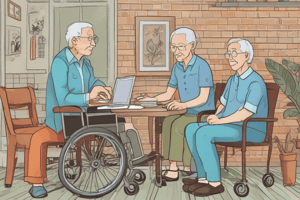Podcast
Questions and Answers
In long-term care, which of the following is NOT a typical responsibility of a nursing assistant?
In long-term care, which of the following is NOT a typical responsibility of a nursing assistant?
- Administering medications to residents (correct)
- Helping residents with meals and feeding
- Providing emotional support to residents
- Assisting residents with bathing and dressing
What is the most important element of effective communication with residents in long-term care?
What is the most important element of effective communication with residents in long-term care?
- Using medical jargon to be precise
- Focusing solely on the physical needs of the resident
- Active listening and empathy for the resident's needs (correct)
- Speaking quickly to convey information efficiently
Which of the following is NOT considered a barrier to effective communication in long-term care?
Which of the following is NOT considered a barrier to effective communication in long-term care?
- Hearing or vision impairments
- Language differences
- Cognitive decline or dementia
- Using clear and concise language (correct)
What is the primary purpose of the Minimum Data Set (MDS) in long-term care?
What is the primary purpose of the Minimum Data Set (MDS) in long-term care?
Which of the following scenarios represents a non-medical emergency that a nursing assistant could handle?
Which of the following scenarios represents a non-medical emergency that a nursing assistant could handle?
Which of the following is NOT an example of proper infection prevention and control practices in long-term care?
Which of the following is NOT an example of proper infection prevention and control practices in long-term care?
Flashcards
Long-term care vs other healthcare settings
Long-term care vs other healthcare settings
Long-term care provides extended support for individuals with chronic illnesses or disabilities, unlike other settings that offer temporary or acute care.
Typical long-term care facility
Typical long-term care facility
A facility designed to provide comprehensive care for residents needing assistance with daily activities, often featuring amenities for comfort.
Medicare and Medicaid
Medicare and Medicaid
Medicare is a federal program for seniors and disabled; Medicaid assists low-income individuals with healthcare costs.
Role of the nursing assistant
Role of the nursing assistant
Signup and view all the flashcards
Chain of command in care team
Chain of command in care team
Signup and view all the flashcards
Minimum Data Set (MDS)
Minimum Data Set (MDS)
Signup and view all the flashcards
Study Notes
Long-Term Care
- Long-term care differs from other healthcare settings, such as hospitals or urgent care.
- Long-term care facilities provide a variety of services and support for residents.
- Medicare and Medicaid are federal healthcare programs that pay for long-term care services under specific guidelines.
- Nursing assistants play a crucial role in providing daily care and support to residents.
- The care team includes a variety of professionals, each with specific responsibilities and a chain of command.
- Policies, procedures, and professionalism are vital aspects of working effectively in long-term care. These guide the care provided.
- Ethical and legal behavior, and residents' rights, are fundamental to the practice.
- Properly handling and maintaining resident medical records is crucial and regulated by law.
- The Minimum Data Set (MDS) is a standardized assessment tool used to collect resident information. It helps document resident needs comprehensively and is used for care planning.
- Incident reports document incidents and are used to maintain resident safety and quality of care.
Resident Care Foundations
- Effective verbal and written communication is essential for providing quality care.
- Barriers to communication, such as language differences or cognitive impairments, need to be addressed.
- Special care guidelines are necessary when communicating with residents with special needs. These are specific to an individual resident.
- Safety precautions and procedures are essential for preventing accidents and managing non-medical emergencies.
- Identifying and responding to medical emergencies is crucial for resident well-being in a timely fashion.
- Proactive infection control practices prevent the spread of illness. This is vital for a safe environment.
Study Questions
- How does long-term care differ from other healthcare settings?
- What are the key features of a typical long-term care facility?
- What is the role of a nursing assistant in a long-term care environment?
- Describe the different members of the care team and their roles.
- What are the responsibilities of an individual within the care team?
- Define the importance of policies and procedures in healthcare settings.
- Explain the concept of professionalism in nursing care.
- How can legal and ethical behavior affect the quality of care provided?
- List resident rights in a long-term care setting.
- Describe the impact of the legal aspects of the resident's medical record.
- What is the purpose of the Minimum Data Set (MDS)?
- Explain the role and process of incident reporting.
- What are essential communication skills for a nursing assistant?
- Describe potential barriers to communication with residents.
- Explain special communication techniques for residents with unique needs.
- How are safety procedures related to resident well-being?
- Explain how to recognize and handle non-medical emergencies in a long-term care facility.
- Describe the process of recognizing and responding to medical emergencies.
- How do infection prevention and control practices support resident safety?
- Briefly summarize the role of Medicare and Medicaid in paying for long-term care.
Studying That Suits You
Use AI to generate personalized quizzes and flashcards to suit your learning preferences.





